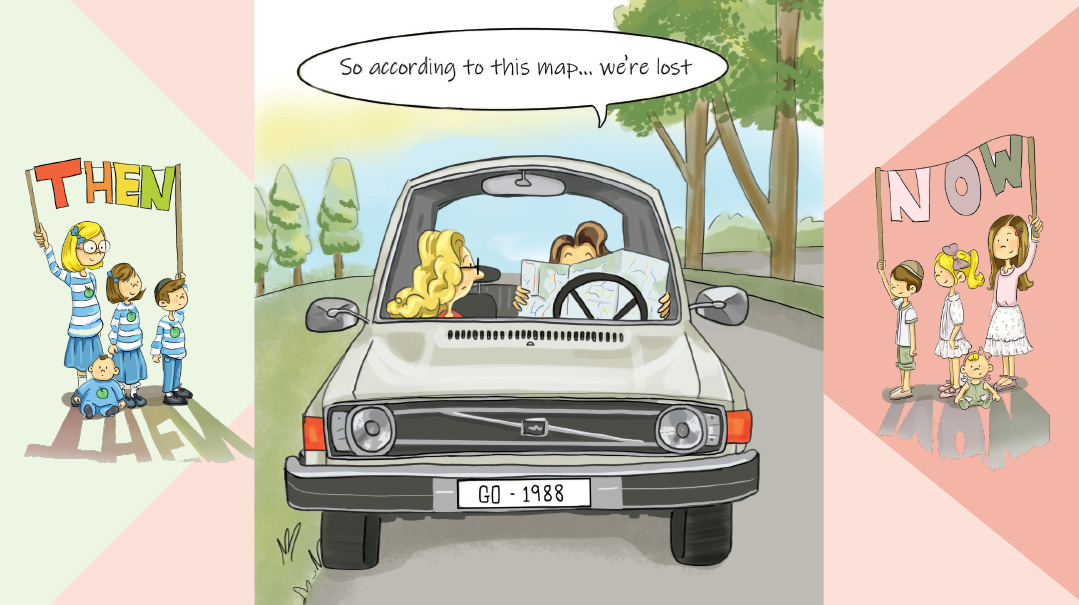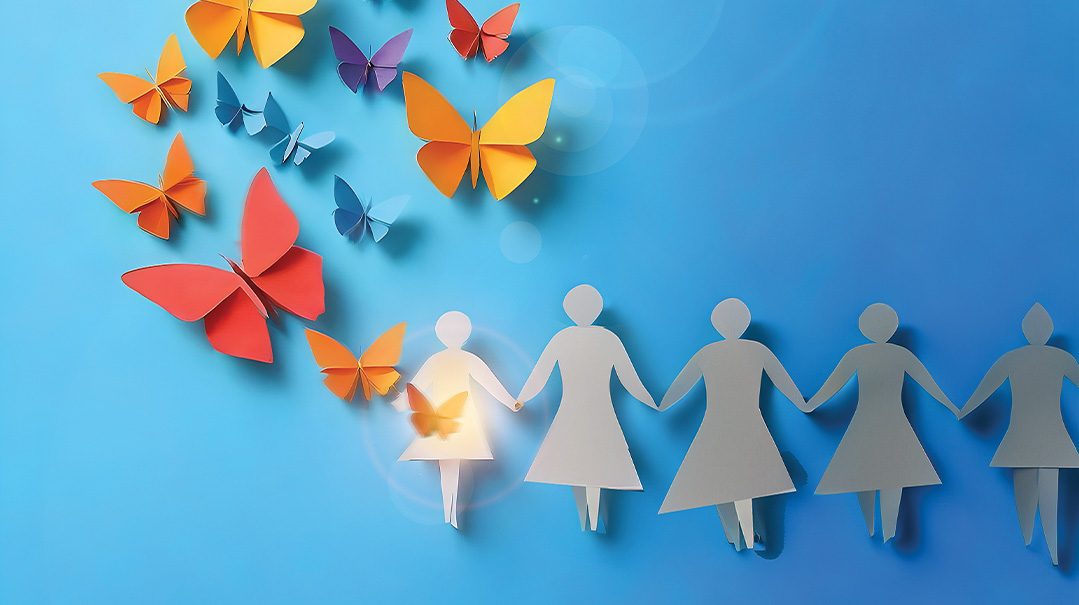Holding Us Together

Four stories of people who were healed despite all expectations to the contrary

When we stood at Har Sinai, we were all whole — body and soul. And while today we often grope in darkness, and sometimes feel so broken, every so often the clouds shift and allow us to see that He’s never left us
Inside Out
Ironically, Temima Simchi* was almost relieved to receive a diagnosis of Irritable Bowel Syndrome. IBS isn’t child’s play; it’s a common chronic condition that affects the digestive system, causing uncomfortable stomach-related symptoms that tend to come and go, and can last for days, weeks, or months at a time. But Temima was grateful that at least there was a diagnosis to explain her symptoms.
“As a kid, I needed colonoscopies, endoscopies, and biopsies. It was a pain,” she says. But while the diagnosis precluded the need for invasive tests, it brought a whole other set of concerns. “I was young, in high school, and I didn’t want to be busy worrying about food.”
Still, she did her best to adjust to the particulars of her adjusted diet and follow her doctor’s instructions, though she didn’t see significant improvement. “I did my due diligence, watching what I ate, suffering setbacks, feeling incredibly ill, moving forward, starting all over again, until I went off to seminary in Eretz Yisrael.”
Then one day, when the sun was shining and the sky was that brilliant Jerusalem blue, Temima suffered a panic attack.
“Something triggered me, and I found myself hyperventilating,” she shares. “It had never happened before; I thought I was dying. I realized quickly that I needed to work through some childhood things. I started attending therapy, bringing up memories I’d tried hard to suppress.”
When Temima returned home from seminary, she was eager to continue her journey within.
Working with her new therapist, Temima had a breakthrough when the therapist suggested that her physical symptoms were possibly a manifestation of emotional pain.
Thinking about it, Temima realized that stress indeed led her to feel sharp physical pains, and she began contemplating that maybe dietary changes wouldn’t be the sum total cure for her illness. In what she calls a leap of faith, she began seriously considering that trauma was at the root of her physical pain.
“I was still conscious that onion hurt my stomach and milk bothered me,” Temima clarifies. “The physical triggers were very real. But as I worked on healing from trauma and pain, my IBS symptoms fluctuated. I don’t have the medical authority to make diagnoses, but it was clear to me that I could heal myself of this chronic condition (or more accurately, I could daven to Hashem that He see my hishtadlus) if I worked to become my best self, and let that heal my insides.”
She finishes on an encouraging note. “These days, I’m practically symptom- free, and I’m raising my baby daughter in a healthy, thriving atmosphere.”
Tiny Triumphs
Rebbetzin Ariella Denitz, kiruv coordinator for Jeff Seidel, and busy mom of a handful of cuties, takes the time to share her story.
“My mother was 23 weeks pregnant with twins when she went for a routine checkup. In the doorway, she heard the doctor on the phone, saying, ‘Oh, this woman isn’t going home. She’s staying here and going straight on bedrest.’
“My mom remembers thinking, Poor woman, some people have it so hard. “She didn’t realize she was that poor woman.”
Ariella’s mother was in danger of early labor. The doctor put her on immediate bedrest in the hospital, but that could only hold things off so long. At 27 weeks she gave birth to two tiny baby girls.
The two miniature little girls weighed 900 grams each (1.9 pounds). The doctor had never delivered such tiny babies before. It was touch and go, but b’chasdei Hashem, both twins beat the odds.
“We were so little and so susceptible to germs,” Ariella says. “One doctor refused to wear gloves while checking us, claiming water and soap was enough. Afterward, a nurse told my mother she thinks that was the cause of many complications, especially for my sister Tali, who developed a staph infection at several weeks old.”
While at first the twins had shared one isolette, once Tali got sick, they were separated. Their progress diverged as well; while Ariella continued to grow at a healthy rate, Tali was diagnosed with cerebral palsy shortly after birth, and her weight dropped to a pound and a half.
Ultimately, the doctors were able to successfully treat Tali’s infection with gentamycin, but while the treatment saved her life, she didn’t escape unscathed. She was left with bone deformities — she barely has any bone in one of her upper arms, and one leg is shorter than the other — and has profound hearing loss.
Finally, after spending three harrowing months in the NICU, Ariella’s mother brought her daughters home, right around the time of her original due date.
Today, both twins are living in the Holy Land. Tali, who recently made aliyah, lives in Gush Etzion, in an apartment with other women, just a short drive away from Ariella and her family. She works in a studio making beautiful ceramics and she hopes to find her bashert in the near future.
Ariella pauses. “So we’re both miracles, honestly. Tali, who survived illness, infection, and pain, and I, who survived and grew up healthy.”
Against All Odds
Kaley Zeitouni was a regular 12-year-old growing up in Los Angeles when she was diagnosed with multiple sclerosis (MS).
The neurologist showed her the images from her MRI, and pointed out the lesions on her brain. Kaley was a spunky kid; she looked right back at him and asked if she could ever heal. Without missing a beat, he said, “No.”
But Kaley didn’t buy it. “Thankfully, I was a resilient kid and his words bounced right off me, saving me from a potentially depressive state,” she says. That’s impossible, I thought. We’re ever-growing humans, our cells forever dying and being recreated. Why would there be no hope for recovery?
The diagnosis created a huge shift in the Zeitouni family, affecting the lives of her parents, her brother, and her friends. There was no normal anymore.
While MS presents differently in different patients, in Kaley’s case, the disease was active, and it wreaked havoc on her body. She remembers a particularly harrowing time after being diagnosed, when she developed nystagmus (a condition causing the eyes to rapidly move from side to side).
She had to keep her eyes closed for 60(!) days.
She took a lot of medication, but it still wasn’t enough. “I was sick, I was in pain,” she says. “I experienced paralysis in my legs at times and even in my hands.”
Years later, in college, she would become blind in one eye, and at one point she was precariously close to death when all her internal organs shut down. “They told me in the ER that it didn’t make sense that I was alive given the symptoms I was experiencing. Yet they had nothing to offer me.”
But Kaley never allowed her condition to break her spirit. While her parents weren’t observant, they had strong faith in Hashem. Any time they faced a challenge, her parents assured their kids that Hashem would take care of it. “That was the foundation of our home,” she says.
Kaley’s illness forced her to turn inward. “When I had the nystagmus and was in bed with my eyes closed, there was little to do. I was bored and lonely, and although my brother would come cheer me up after school, I had long mornings alone. And so I talked to Hashem.
“We had long conversations and a relationship developed. Mostly, I learned to say thank you. Thank You for giving me parents strong enough to help me physically, to shower me and feed me and carry me, thank You for the medication and my brother and good health insurance, anything else I could think of. And that gratitude laid the groundwork for our partnership.”
As time went on, Kayley realized her struggle was impacting those around her for the better. Friends shared that she had changed their lives. People told her they were inspired by her to be more present, more loving, more grateful. “Slowly, I saw a purpose in it all,” Kaley says. “I could do something, inspire others.” She started sharing her story and advocating for MS patients.
She was also determined to live a normal life, despite her limitations. She would travel and administer injections to herself while in airplane lavatories or at sleepovers with friends. And while the first neurologist she saw warned her she shouldn’t expect to attend college, she proved him wrong, earning a BA in psychology, a BS in health promotion and disease prevention, and an MA in clinical psychology with an emphasis on marriage and family therapy.
Today she’s a licensed marriage and family therapist. She worked in the field for many years before taking on fundraising jobs for different non-profit organizations in the US, Israel, and the UK.
At 29, she decided to make aliyah, though fully aware that the stress could potentially cause a flareup. And sure enough, three days after arriving in the Holy Land, she woke up and couldn’t open her water bottle. She tried to call for help, but couldn’t dial.
She remembers her initial reaction. Oh, good, at least it’s just my hands, not my eyes. Her next thought was less accepting. This isn’t a normal way to live!
Right then, she made a decision: She wasn’t going to live like this any longer. She drew deep into that conviction she’d felt when speaking to the doctor when she was 12, that there must be hope for recovery, and her disbelief when he’d said she would never heal. And just like that, she was on a mission.
Kaley was determined to learn everything she could about mind-body medicine, and she says, “Hashem sent me all the guides I would need for my healing journey.”
She learned everything she could get her hands on, starting with EFT — a mind-body method of tapping acupuncture points on the hands, face, and body with your fingertips while focusing on an issue or feeling you’re hoping to resolve — and then delving into psychoneuroimmunology, the study of how the nervous system and the immune system work alongside one’s emotions.
“You need to learn how to process your emotions in a healthy way, or your body will take those unhealthy emotions and store them via the nervous or immune systems,” she says emphatically.
As she started working through years worth of clogged emotions, she found she had so much more room for Hashem in her life. “And with Hashem more present, I started to heal,” she says simply.
She delved into chassidus, drawing from the wisdom of the Arizal and the Baal Shem Tov, from the Piaseczna Rebbe’s step-by-step tools to communicate with and heal the body, and especially from Rav Avraham Sutton’s teachings.
At the end of a two-year process, her journey climaxed. “One day I woke up,” she says, “and I knew I was done. I stood in my living room, and there was a different energy: I knew I was no longer ill.”
A few months later, she went to a top neurologist for a checkup.
He examined her and looked at her stunned. “I don’t know what you did, but you’re done,” he said.
“I know,” I replied evenly.
“You’re classified as NEDA (no evidence of disease activity),” he continued in a disbelieving tone.
Many people with symptoms or illness feel betrayed by their bodies, Kaley explains. “But the truth is the body is just uneasy. Disease is dis-ease, the body is in conflict. When you work with your body, you can bring Hashem in, you can live with Him, and you can heal.”
One year ago, on Lag B’omer 5782, Kaley married Adam Betzalel Hernandez. Today, she’s determined to help others find their happy endings too.
She’s a motivational speaker on a mission to inspire others to find healing and relief on their individual journeys. She offers a healing course called Get Your Body, predicated on her firm conviction that every single person can experience relief from illness following certain protocols. She works with others to reduce their symptoms through understanding their health blueprint, unpacking illness identity, and unlocking the body’s natural healing ability.
Pray, Live, Eat
Levi Chaim Stein* was the third child in his family in as many years, following two-year-old Miriam and one-year-old Chevi.
Baby Levi Chaim had a rocky start. Besides a small heart defect, which the doctors were sure would correct itself with time, he also had fluid in his lungs and would turn blue whenever he’d nurse. His parents added the name Chaim at his bris to reflect their hopes for a healthy child.
Unfortunately, at the bris itself, he caught RSV. (In an unrelated, related note: Don’t attend a bris where the guest of honor is a vulnerable newborn if you don’t feel well!) From then he was stuck in what seemed like a cycle of never-ending respiratory issues. He basically had a full-time pulmonologist on call.
Respiratory issues make the heart work overtime and the fluid in his lungs aggravated his respiratory issues, so baby Levi was stuck in a vicious cycle. His heart grew enlarged from the strain, and at 18 months, he underwent surgery to close an open duct between the heart and lungs.
The Steins were hopeful that Levi would recover and become a normal toddler after surgery, but their relief was premature. The surgeon realized that something didn’t sound right with little Levi’s voice.
Examination showed that he was suffering from severe reflux, which had led to vocal chord paralysis. Fortunately for the Steins, the vocal chords were paralyzed in an open position. If they had been paralyzed in a closed position, he would have needed a trach. But Levi was aspirating — everything he ate was going straight into his lungs.
Levi stayed in the hospital for observation for a few days, which slowly turned into a month. Then, on the night he was to be discharged, he developed a fever. A chest X-ray showed severe pneumonia.
He underwent another surgery to address the reflux, and he was also fitted with a G-tube to enable long-term feeding. The doctors hoped a stretch of time with no oral eating would allow his vocal chords to heal, enabling him to ingest food without aspirating.
It wasn’t an easy time, his sister Miriam remembers. “My mother was once again expecting, not to mention caring for us two ‘big’ ones at home, yet she refused to eat in front of Levi. If he couldn’t eat, neither would she. She’d wait until he was asleep before quickly biting into something, no matter what cravings she experienced.”
Eventually, Levi came home with a feeding tube. A special morah, Morah Liba, accepted Levi into her play group, and he did what toddlers do, except for one thing: He couldn’t eat or drink.
“Most kids with feeding tubes are either ill and too nauseous or weak to want to eat, or have been fitted with a tube shortly after birth and don’t know what they’re missing,” Miriam says. “Not Levi. He knew food and he missed it.
“He’d sneak dirty Cheerios off the floor, or try to drink the bathwater. It was heartbreaking. My parents had to make a rule: No eating in front of Levi. Family seudahs and dinners disappeared; we all took turns eating, so as not to cause him any more pain.”
Desperate to help him, Levi’s parents took him to see a doctor whose specialty was swallowing. While testing showed that Levi’s vocal chords had started working, she still maintained that he would need the feeding tube for life.
The miraculous turning point came when Levi was four years old, and Mrs. Stein took her young brood for their yearly checkups. The nurse was harried, and when she pulled up Levi’s shirt to give him a shot, she accidentally pulled out his feeding tube.
“My mother didn’t have her backup one with her, and the tube had broken when it fell out, so there was no putting it back in,” Miriam recalls. “The doctors and nurses encouraged my mother to come to the conclusion that for the time being, she should leave it out. And honestly, that was it. It never went back in. Levi managed to learn how to swallow without endangering his lungs.
“That terrible doctor had to eat her hat, and Levi has grown into a young father with a regular, healthy appetite.
“There was such tremendous Hashgachah along the way. Shortly after Levi started eating, his entire medical team relocated. One moved, one switched jobs, one retired. It was like Hashem was saying, ‘I put them there just for you, and now they can go elsewhere.’
“I was too young to appreciate the greatness of my parents’ sensitivity toward my little brother, or the stark reality of the open neis. But today, both those things lend me, my family, and all who know the story tremendous chizuk.”
*names have been changed
(Originally featured in Family First, Issue 844)
Oops! We could not locate your form.







